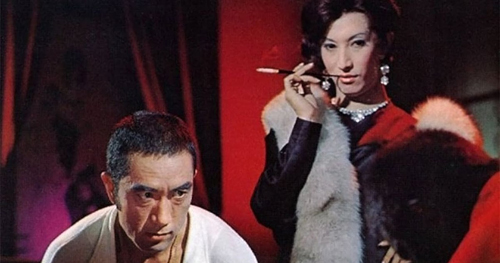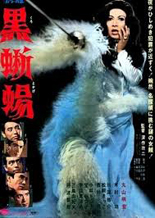
Although Rampo Edogawa, Japan’s answer to Edgar Allan Poe, had seen his material adapted for the screen dozens of times in his life, he died just a few years before the Golden Age kicked off. We’re talking Blind Beast, Horrors of Malformed Men and, coming first, Black Lizard, all within a year and a half. Talk about a trifecta!
One of the legendary Seven Samurai, Isao Kimura headlines this crazy crime tale as Akechi, a private detective with a lot going on. While investigating the disappearance of a corpse from a med school lab, he’s hired by the jeweler Iwasa (Jun Usami, The Vampire Doll) to protect his daughter, Sanae (Kikko Matsuoka, The Living Skeleton), at the secret go-go club where she works.
As Akechi is told, Iwasa’s been warned Sanae will be kidnapped by the mysterious Black Lizard, perhaps to get at his invaluable Star of Egypt diamond. A chloroformed rag or two later, Akechi fails his duties. Unknown to our dick, but not to our minds, is the Black Lizard’s true identity: the woman who runs the club.

Given the Black Lizard’s hunchbacked henchman, a snake-throwing henchwoman and a Sax Rohmer-ready hideout, it’s not like the movie lacks in audience appeal. But here’s where things get really interesting, because she was really a he — Akihiro Miwa, arguably Japan’s most celebrated drag queen.
For today’s viewers (who may recognize Miwa’s voice as Princess Mononoke’s Wolf Goddess), the actor’s true gender is no secret; it’s obvious as soon as his female character appears. Yet the more the Black Lizard is set up not only as Akechi’s foil, but as his potential paramour, the more I kept anticipating a proto-Crying Game reveal. To the progressive credit of director Kinji Fukasaku (Battle Royale), it never arrives!
Equal parts cigarette smoke and champagne effervescence, and buoyed by a score by Isao Tomita — yes, that Tomita! — Black Lizard is a real Pop Art blast from the Far East. Both informed by and showing up American pulp fiction, Fukasaku’s confection has style to burn and then some. —Rod Lott

